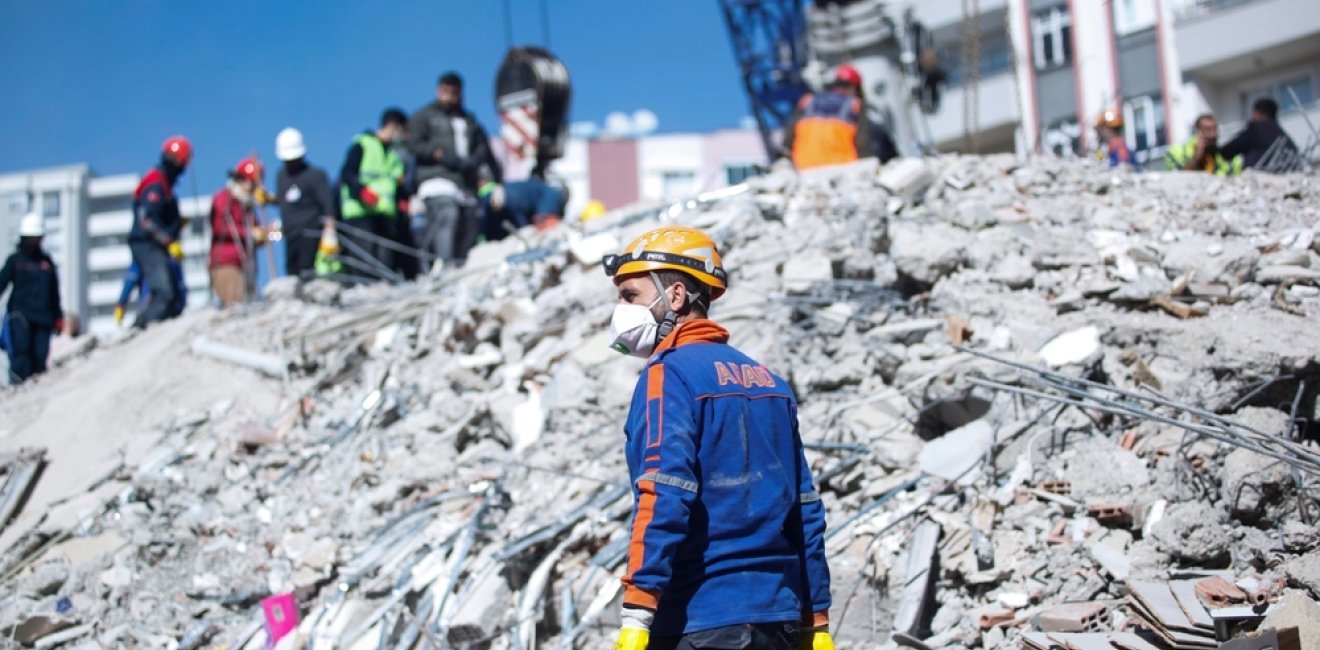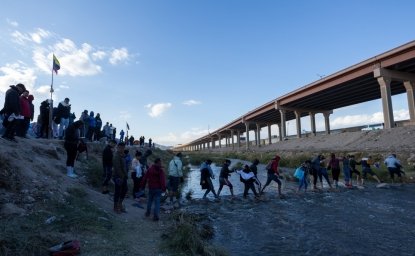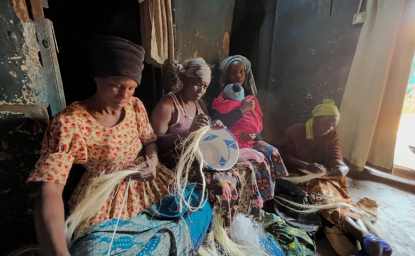This article was originally published by New Security Beat, a publication of the Wilson Center Environmental Change and Security Program.
Madiha vaguely remembers her family fleeing war-torn Syria. But even a decade later, she still bursts into tears describing their midnight escape across the border to Turkey. She and her family were forced to flee after losing family members in a civil war in which they had no stake.
Little did Madiha—who is now 11 years old—and her family know they would experience another monumental trauma a decade later. This time, it was a 7.8 magnitude earthquake that rocked large swaths of southern Turkey on early February 6, 2023.
The roof they built with their own hands collapsed over their heads, killing several of Madiha’s nieces and siblings. "A large piece of brick fell on my mother's leg, but she luckily survived,” she said tearfully.
Rebuilt Lives Shattered
In the absence of opportunities and income, survival is a daily struggle in the camp.
I met Madiha and her 53-year-old father, Jahid, as part of an assessment team from Corus International, a Washington, D.C.-based international NGO providing emergency relief in the affected areas in Turkey.
We spoke in a tent in the Kirikhan district on the outskirts of Antakya, the provincial capital of Hatay province in southern Turkey. There were 200 tents in the camp, housing more than 1,200 inhabitants, all of them refugees from Syria.
Madiha wept throughout our conversation, while Jahid seemed still in shock and numb. A few cushions, a quilt, and a blanket covering the dirt floor were all they had in their tent.
In the absence of opportunities and income, survival is a daily struggle in the camp. Water is available only when the municipality drives in tankers. Survivors have food only when NGOs show up with limited rations. No one knows when and where the next deliveries will come.
Moreover, a lack of sanitation and hygiene pose an imminent risk of illness and disease. There are only eight toilets and two showers for the entire camp.
“The situation is dire,” says Daniel Speckhard, CEO of Corus International, who was also present on the ground assessing the situation. “It’s not just people who have lost their homes, but the entire infrastructure that goes with the economy: hospitals, stores, gas stations, all essential infrastructure is gone. The scale is beyond staggering.”
Securing Shelter
The February earthquake destroyed an estimated 500,000 houses in Turkey alone, and made many more dwellings uninhabitable. The World Bank’s Global Rapid Post-Disaster Damage Estimation (GRPDE) puts the number of homeless people as a result of the catastrophe at 1.25 million.
Most people who have been made homeless now encamp in tent cities such as the one where Madiha now lives. But in this part of the world, where the temperature rises as high as 50°C in summer, they will not be able to reside in tents forever.
The elderly and children here are among the most vulnerable. “I met two 95-year-old elderly women, one who lost four sons, all who would normally be helping and supporting her, Speckhard observed. “The situation is unsustainable.”
Corus International is supporting the construction of a container city in Hatay province, which is a project led by the local NGO IBC. The camp will soon house more than 2,000 people. The Turkish government has announced plans to build 200,000 houses by the end of this year.
Meanwhile, local authorities have been offering limited cash support for displaced people. They promise more help, but those who have fled here face a conundrum: Syrian refugees are not entitled to government aid, and thus must continue to rely upon international humanitarian assistance.
Trauma and Fear of Health Outbreak
As desperate needs grow and help diminishes, risks to the refugees here mount.
Only one hospital serves the entire Hatay province. And in the absence of essential WASH services, officials worry about health outbreaks in the warmer weather on the way. The European Center for Disease Prevention and Control (ECDPC) noted that “a surge of cholera cases in the affected areas is a significant possibility in the coming weeks."
Just across the border, in war-torn northwestern Syria, cholera is already spreading. Local authorities have reported thousands of cases since September 2022.
Along with the fear of the spread of infectious diseases, however, the earthquake-affected population is also faced with psychological trauma.
Along with the fear of the spread of infectious diseases, however, the earthquake-affected population is also faced with psychological trauma. Everyone you meet here has lost someone in their family. Many of them don’t recognize the extent of the suffering on their mental health as a result.
“One of our colleagues lost everyone in the family except his daughter,” says Hakan Koker, a local journalist in Adana. “His daughter was pulled out holding her baby’s dead body in her arms for three days under the rubble.”
Koker added that temporary respite may give way to deeper grief among survivors: “We are hosting them in our office; they seem numb to everything happening around them. I fear their reaction when they realize their loved ones are gone.”
Having already lived through untold losses, Syrian refugees are particularly affected. Mental health support is crucial in any future response in this region.
Uncertain Future and Volatility
As a nonprofit, Corus is often on the frontlines of disasters. Even so, the scale of the February earthquake’s devastation is striking. The World Bank has estimated direct physical damages caused by the latest quake in Turkey exceeding $34.2 billion, the equivalent of 4 percent of the country’s 2021 GDP.
This figure does not include the damage and suffering endured by the millions of Syrian refugees, who have called Turkey home for the past decade. They have borne the brunt of the impact from February’s tragic events, with little to no help trickling their way.
Tension is already in the air. Turkey’s economy was in decline even before the earthquake. Syrian refugees have increasingly faced pressure to return home.
Tension is already in the air. Turkey’s economy was in decline even before the earthquake. Syrian refugees have increasingly faced pressure to return home. The humanitarian crisis created by the quake appears to have reignited and heightened those long-standing grievances.
We heard from the officials in numerous local NGOs that they have deliberately segregated Syrian refugees and members of the displaced local population as they plan new camps in order to avoid such tension. As resources dwindle, strains may increase.
Turkey is headed to presidential and parliamentary elections on May 14; the fate of Syrian refugees is already a hot issue. President Erdogan's main challenger in the election is vowing to send Syrian refugees home as an economic crisis looms.
Syrian refugees in Turkey now face an impossible situation. They can’t or won’t return home. They also can’t migrate to Europe, especially as the beachhead nation of Greece further reinforces its border.
It appears that February’s cataclysmic earthquake has once again put millions of traumatized Syrian refugees in Turkey between the devil and the deep blue sea.
The views expressed in these articles are those of the author and do not reflect an official position of the Wilson Center.
This article was originally published by New Security Beat, a publication of the Wilson Center Environmental Change and Security Program.






